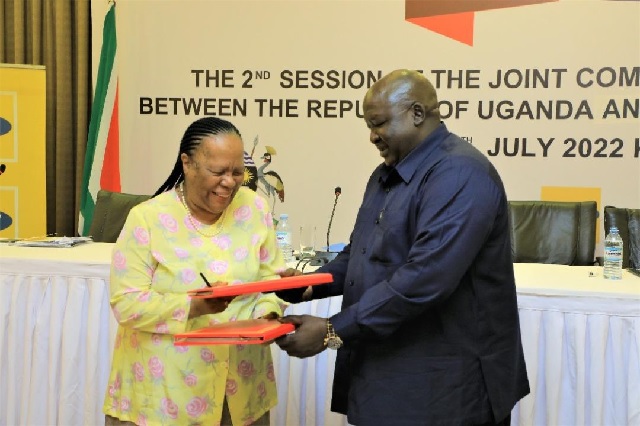
Kampala, Uganda | THE INDEPENDENT | South Africa is concerned that most African countries still consider national interests ahead of regional integration which continues to stifle regional trade and development.
According to South African Minister for International Relations and Cooperation Naledi Pandor, this is likely to limit the outcomes of the African Continental Free Trade Area and other initiatives aimed at promoting the development of the region through trade.
She says for as long as each country feels strongly about protecting its own interest and sovereignty, the highly cherished continental trade will not be realized. Pando was speaking at the Uganda-South Africa Joint Commission for Cooperation meeting, the first since 2012, which is aimed at strengthening the cooperation between the two countries in varying areas.
Top on the agenda was trade not only between the two countries but also intra-African, especially as the African Continental Free Trade Area is in its young stages of implementation. Under the Agreement, countries are supposed to surrender their tariff lines to allow free movement of goods, with poorer countries like Uganda given at least 10 years to liberalise at least 90 per cent of tariff lines.
They will be allowed to protect up to three per cent of their products with tariffs. Richer countries like South Africa will liberalise at least 90 per cent of tariff lines within five years, a provision aimed at preventing a revenue shock for poorer countries which highly depend on taxes on imported goods.
Minister Pandor says countries should go beyond protecting markets if the ‘wonderful but unimplemented’ trade initiatives Africa has, are to be of benefit.
Despite the close relations spanning more than half a century, trade between Uganda and South Africa is at a low of 197 million US Dollars. However, of this, 80 per cent is in form of Ugandan imports.
State Minister for Foreign Affairs Henry Okello Oryem says the trade must be more balanced if the people of Uganda are to benefit from the positive relations. Apart from imports of vehicles, industrial machinery, food and pharmaceuticals, among others, Uganda spends more on sectors like tourism and medical care in South Africa.
While South Africa has invested in Uganda’s telecom, banking, retail and manufacturing industries among others, Oryem asked them to increase the investment in value addition in Uganda to reduce Uganda’s importation of finished products.
He however hailed the ongoing trade promotion initiatives, including talks to waive visa requirements for Ugandan ordinary passport holders.
Pandor pleaded with other African countries to ensure that initiatives that are put in place are implemented, instead of jumping on new ones and leaving the existing ones idle. She cautions that the current generation of leaders will be held responsible if they fail to achieve the development goals required by the public, including the aims of the 2063 development agenda.
On the current economic crises caused by high inflation rates across the continent, Pandor urged African leaders to put in place measures that will ensure the poor are not adversely affected further than they already are. She condemned the war between Russia and Ukraine as unnecessary and only destabilising the global economies.
At the open session of the meeting, Minister Oryem also expressed Uganda’s discontentment at the news that at the Lazarus Farm in South Africa, a bull costs 10 times more than in Uganda. He said, however, that South Africa should help Uganda with a better market for her cows that are in plenty.
*****
URN
 The Independent Uganda: You get the Truth we Pay the Price
The Independent Uganda: You get the Truth we Pay the Price





